
Kotuitui-New Zealand Journal of Social Sciences Online
Scope & Guideline
Illuminating Pathways in Multidisciplinary Research
Introduction
Aims and Scopes
- Cultural Studies and Indigenous Knowledge:
The journal emphasizes the importance of indigenous perspectives, particularly Māori knowledge systems, in understanding social issues. This includes exploring cultural practices, identity, and the implications of colonial histories. - Social Policy and Health:
Research often addresses social policies affecting health and well-being, particularly among marginalized communities. This includes analyses of mental health services, healthcare accessibility, and public health initiatives. - Migration and Multiculturalism:
The journal explores the experiences of migrants and ethnic minorities in New Zealand, focusing on identity, integration, and the social dynamics within multicultural settings. - Environmental and Climate Justice:
Research in this area examines the intersection of social issues with environmental challenges, including the impact of climate change on communities, indigenous rights in environmental policy, and sustainable practices. - Education and Social Equity:
The journal addresses themes of equity in education, particularly how systemic barriers impact access and participation for diverse populations in New Zealand's educational landscape. - Community and Well-being:
Studies often center on community engagement, social cohesion, and well-being. This includes qualitative research on community experiences and participatory approaches to social issues.
Trending and Emerging
- Indigenous Rights and Sovereignty:
There is a marked increase in research focusing on Māori sovereignty and rights, especially in relation to health, education, and environmental justice, indicating a broader societal recognition of these issues. - Mental Health and Well-Being:
The journal is seeing a surge in studies addressing mental health, particularly among marginalized communities, reflecting a growing acknowledgment of mental health as a critical public health issue. - Social Justice and Equity:
A heightened focus on social justice issues, including systemic inequalities and their impacts on various populations in New Zealand, is emerging, with researchers advocating for policy changes. - Community-Based Research and Participatory Approaches:
There is a trend towards community-engaged research methodologies, which prioritize the voices and experiences of local communities in the research process. - Climate Change and Indigenous Knowledge:
Increasingly, research is exploring the intersection of climate change and indigenous knowledge systems, emphasizing the role of Māori perspectives in environmental sustainability. - Technology and Social Change:
Emerging themes around the impact of technology on social dynamics, including digital engagement and the implications of artificial intelligence for marginalized communities, are gaining traction.
Declining or Waning
- Traditional Public Health Approaches:
There has been a noticeable shift away from traditional public health models towards more integrated and community-based approaches, reflecting a broader understanding of health as a social construct. - Historical Narratives without Contemporary Relevance:
Papers focused solely on historical perspectives without linking to current social issues or implications are becoming less common, as the journal encourages more applied research. - Generic Research on Social Issues:
Research that lacks a specific New Zealand context or fails to engage with local communities and cultures is less likely to be published, indicating a move towards more localized and relevant studies. - Academic Theories without Practical Application:
There is a declining interest in purely theoretical discussions that do not address practical implications for policy or community well-being, as the journal aims to impact real-world issues. - Limited Focus on Non-Indigenous Perspectives:
Papers that center on non-indigenous perspectives without acknowledging or integrating indigenous viewpoints are increasingly less favored, reflecting the journal's commitment to inclusivity.
Similar Journals
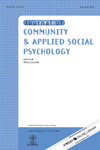
JOURNAL OF COMMUNITY & APPLIED SOCIAL PSYCHOLOGY
Advancing community engagement through innovative research.The Journal of Community & Applied Social Psychology, published by Wiley, stands as a leading voice in the realm of social psychology, sociology, and political science. With an impressive Q1 ranking in both social psychology and sociology (2023), this journal plays a pivotal role in disseminating groundbreaking research that addresses critical social issues and promotes community engagement. Its high standing is reflected in the Scopus rankings, placing it in the 85th percentile in Sociology and Political Science and the 70th percentile in Social Psychology, underscoring its academic excellence and impact. Scholars and practitioners alike are encouraged to contribute to and engage with its comprehensive studies, innovative methodologies, and theoretical advancements. Spanning from 1991 to 2024, the journal's robust archive empowers researchers and students to explore diverse perspectives and enhance their understanding of social dynamics, making it an indispensable resource in the field.
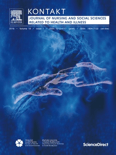
KONTAKT-JOURNAL OF NURSING AND SOCIAL SCIENCES RELATED TO HEALTH AND ILLNESS
Fostering collaboration in nursing and social sciences.KONTAKT - JOURNAL OF NURSING AND SOCIAL SCIENCES RELATED TO HEALTH AND ILLNESS is a pioneering peer-reviewed open-access journal, published by the Faculty of Health and Social Sciences at the University of South Bohemia, Ceske Budejovice, Czech Republic. Since its inception in 2014, the journal has been dedicated to advancing knowledge in the fields of nursing and social sciences as they relate to health and illness, fostering interdisciplinary collaboration and innovative research. With a current impact factor that positions it within the Q4 category across diverse health-related fields like Nursing and Public Administration, it serves as a valued resource for researchers, practitioners, and students alike. The journal’s commitment to open access ensures that high-quality research is accessible to a global audience, enhancing its relevance and impact within the academic community. Researchers are encouraged to contribute their findings to address pressing health issues and contribute to the ongoing dialogue in this vital area of study. For more information, please visit the journal's website or reach out to the editorial team directly at their address: J Boreckeho 27, Ceske Budejovice, Czech Republic.
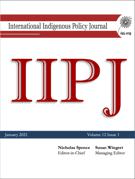
International Indigenous Policy Journal
Empowering Indigenous Perspectives WorldwideInternational Indigenous Policy Journal, published by University of Western Ontario, serves as a pivotal platform in the fields of Anthropology, Cultural Studies, and Sociology and Political Science. Since its inception in 2010, this Open Access journal has championed the dissemination of scholarly works that advance the understanding and implementation of indigenous policies globally. Operating from the esteemed academic setting of London, Ontario, Canada, it has solidified its reputation, as evidenced by its impressive category quartile rankings, notably achieving Q1 status in Cultural Studies and Q2 rankings in both Anthropology and Sociology/Political Science in 2023. Researchers, professionals, and students can find exceptional insights within its pages, as it ranks in the top percentiles for its respective fields, reflecting its crucial role in influencing contemporary dialogues surrounding indigenous issues. With a commitment to inclusive scholarship, International Indigenous Policy Journal continues to be an essential resource for those dedicated to understanding and supporting indigenous communities and their policy contexts.

Aotearoa New Zealand Social Work
Fostering community, enhancing well-being.Aotearoa New Zealand Social Work is a pivotal journal dedicated to advancing the practice and scholarship of social work within Aotearoa New Zealand and beyond. Published by the Aotearoa New Zealand Association of Social Workers, this peer-reviewed journal serves as an essential platform for researchers, practitioners, and students, fostering a community committed to enhancing social well-being and addressing social justice issues. With a focus on local and global social work practices, it aims to disseminate innovative research, case studies, and critical discussions that shape the future of the profession. Although the journal operates under a traditional access model, its contributions are invaluable to scholars and professionals seeking to bridge theory and practice in the field. As an emerging publication within its category, Aotearoa New Zealand Social Work plays a critical role in informing policy and practice, ultimately enriching the social work landscape in New Zealand and providing a model for similar contexts globally.

Revista Conrado
Empowering voices in academic collaboration.Revista Conrado, an esteemed academic journal published by UNIV CIENFUEGOS, specializes in a broad spectrum of topics within the field of education, social science, and cultural studies. With its commitment to Open Access publishing since 2012, the journal not only enhances the visibility of research but also fosters the dissemination of knowledge globally. Based in the vibrant city of Cienfuegos, Cuba, this journal aims to provide a platform for scholars, practitioners, and students to share original research findings, reviews, and insights that contribute to the advancement of their disciplines. As it continues to grow in both reputation and impact, Revista Conrado plays a pivotal role in nurturing scholarly dialogue and collaboration across international academic communities.
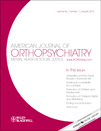
AMERICAN JOURNAL OF ORTHOPSYCHIATRY
Exploring the intersection of theory and practice in mental health.AMERICAN JOURNAL OF ORTHOPSYCHIATRY, published by the Educational Publishing Foundation of the American Psychological Association, is a premier peer-reviewed journal dedicated to advancing the fields of psychology, psychotherapy, and mental health. With a long-standing history dating back to 1930 and a commitment to publishing impactful research, the journal holds esteemed positions in several academic categories, ranking Q1 in Arts and Humanities, Developmental and Educational Psychology, and Psychiatry and Mental Health as of 2023. Its impressive Scopus rankings further reinforce its significance, with high percentiles across diverse subfields. Although not open access, the journal provides invaluable insights and innovative findings crucial for researchers, professionals, and students alike, fostering a deeper understanding of mental health paradigms and treatment approaches. By publishing rigorous empirical studies and theoretical contributions, the AMERICAN JOURNAL OF ORTHOPSYCHIATRY remains at the forefront of scholarly discourse, making it an essential resource for those committed to enhancing psychological practice and academic inquiry.
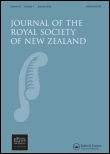
JOURNAL OF THE ROYAL SOCIETY OF NEW ZEALAND
Connecting Ideas, Inspiring DiscoveriesWelcome to the JOURNAL OF THE ROYAL SOCIETY OF NEW ZEALAND, a prestigious multidisciplinary publication hosted by Taylor & Francis Ltd. Since its inception in 1971, this journal has served as a vital platform for disseminating groundbreaking research across diverse fields, from the natural sciences to the humanities, contributing to its strong ranking within the top quartile (Q1) of multidisciplinary journals. With an impressive Scopus ranking of #28 out of 171 and an 83rd percentile placement, the journal is recognized for its high-quality contributions that advance knowledge and innovation. Though it currently does not offer Open Access options, its comprehensive scope and impactful publications make it an essential resource for researchers, professionals, and students alike, striving to push the boundaries of discovery and understanding. As we continue to progress through 2024, we invite you to engage with our diverse array of articles that reflect the vibrant research landscape of New Zealand and beyond.
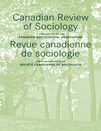
Canadian Review of Sociology-Revue Canadienne de Sociologie
Exploring the Depths of Social Science Discourse.Canadian Review of Sociology-Revue Canadienne de Sociologie is a prestigious journal tailored for sociologists and social scientists, published by WILEY. Since its inception in 1964, this esteemed journal has served as a critical platform for the dissemination of high-quality research in both the arts and humanities and broader social sciences, holding a commendable Q1 ranking in Arts and Humanities and Q2 ranking in Social Sciences as of 2023. With an impressive Scopus percentile ranking—78th in Arts and Humanities and 73rd in General Social Sciences—the journal underscores its influence and relevance in contemporary sociological discourse. Researchers and practitioners alike can expect rigorous peer-reviewed articles that contribute to theoretical and empirical debates, as well as discussions on pressing societal issues. While currently not open access, the journal continues to be integral for academic institutions and researchers keen on exploring the intricacies of sociological phenomena across generational and cross-cultural lines, with converged years extending to 2024. Addressed from Hoboken, NJ, the journal not only enriches the academic landscape but also cultivates a global community of sociologists committed to advancing knowledge.

Journal of Postsecondary Education and Disability
Enhancing Understanding of Disability in Higher Education.The Journal of Postsecondary Education and Disability (ISSN: 2379-7762; E-ISSN: 2328-3343), published by the Association on Higher Education and Disability (AHEAD), stands as an essential resource for researchers, professionals, and students dedicated to the study and enhancement of postsecondary education for individuals with disabilities. This esteemed journal aims to foster a deeper understanding of accessibility issues, inclusive practices, and policy development within higher education contexts, thereby facilitating academic discourse and innovative solutions. With its commitment to advancing knowledge and promoting best practices, the journal serves as a pivotal platform for sharing empirical research, theoretical discussions, and case studies that address the multifaceted challenges faced by students with disabilities. By providing high-quality content that bridges research and practice, the Journal of Postsecondary Education and Disability plays a critical role in shaping inclusive educational environments and empowering diverse student populations.

AMERICAN JOURNAL OF COMMUNITY PSYCHOLOGY
Advancing community well-being through innovative research.American Journal of Community Psychology, published by Wiley, is a premier journal dedicated to advancing the field of community psychology through innovative research and practical applications. With an impressive impact factor and categorized in the prestigious Q1 quartiles across several disciplines—including Applied Psychology, Health (social science), Public Health, and Social Work—this journal serves as a vital platform for researchers, practitioners, and students alike, fostering a deeper understanding of the psychological dimensions of community life. Established in 1973 and continuously thriving until 2024, it provides a critical forum for scholarly articles that explore the intricate interactions between individuals and their communities. The journal’s commitment to high-quality research is evident in its significant Scopus rankings, which place it among the top-tier publications in its field. Although currently not open access, the journal’s repository is rich with essential insights and findings that contribute to the ongoing dialogue in community mental health and well-being.